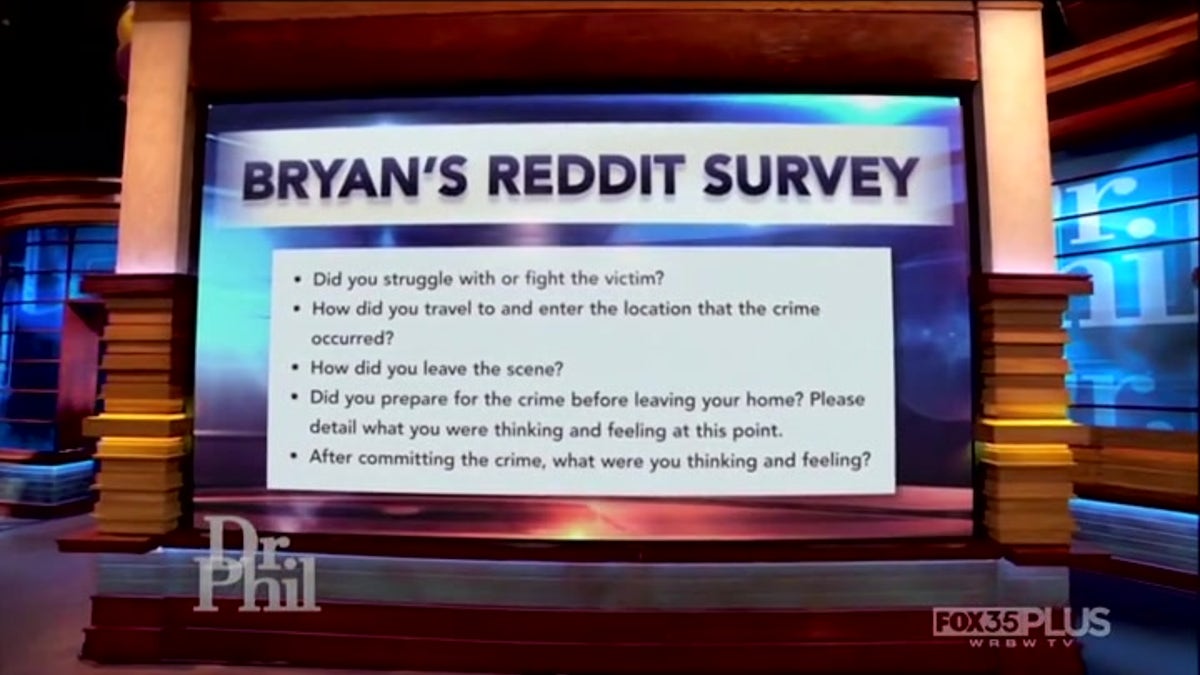Dr. Phil guests discuss Idaho murder suspect
A panel of experts discussed evidence that has come to light against the Idaho murder suspect.
Experts discussed damning evidence posted to social media by the suspect of the Idaho murders on "Dr. Phil" Thursday.
University of Idaho students Kaylee Goncalves, 21, Madison Mogen, 21, Xana Kernodle, 20, and her boyfriend, Ethan Chapin, 20, were stabbed to death in the early hours of Nov. 13 in Moscow, Idaho. Bryan Kohberger, a Ph.D. student in criminology at nearby Washington State University, has been charged with four counts of first-degree murder and felony burglary for the quadruple homicide.
Dr. Phil encouraged his guests to take a look at a survey written by Kohberger and posted on Reddit. In the survey, purportedly for his graduate program, Kohberger asked criminals about how they planned and executed their crimes, with some phrasing that made Dr. Phil and his guests balk.
He asked criminals to recount, "Did you struggle or fight the victim? How did you travel and enter the location that the crime occurred?" The suspect also asked, "What was the first move you made in order to accomplish your goal?"

Dr. Phil hosted an episode about the suspect of the Idaho murders.
Trial attorney Mercedes Colwin suggested the Reddit survey would be used against Kohberger in court.
"If you match up that survey against that affidavit, it’s mind-blowing," she said. "The very first question he asked in that survey, where he’s trying to ask about the emotions that people are feeling when they’re committing crimes, is, ‘how did you target your victims?’ Well, you go back to the affidavit, and they go back to the 12 pingings of his phone in and around that [crime scene]."
She also noted a second time when he appeared to follow criminals’ advice.
"The second step, ‘but what did you do in preparation for the crime.’ Well, if he’s in fact the killer, obviously is only a suspect, he turns the phone off," she noted. "We know in the affidavit it says that phone turned off for the duration of the time that he allegedly traveled to the home, committed the crimes. And then only until he was back on the highway, did the phone go back on."
She observed, "All these steps that he asked these criminals in the survey, he seems to have duplicated in the affidavit, according to law enforcement," but then she asked, if he is the killer, "What are we looking at? A sick social experiment?"

Dr. Phil speaks with his guests on an episode about the Idaho murder suspect.
IDAHO MURDERS SUSPECT BRYAN KOHBERGER WILL CHALLENGE EVIDENCE, LAWYER SAYS
Dr. Phil suggested, "I think part of it is he’s wanting to live vicariously through it, and part of it is he’s wanting to know what to expect, because ‘I don’t have normal emotions and I don’t want to panic, I need to know what to expect, what to think.’ That’s odd. He’s asking odd questions."
Senior reporter for DailyMail.com Caitlyn Becker focused on the way the survey was phrased.
"The word ‘goal’ stands out for me, too. ‘How did you achieve your goal?’ I have goals, we all have goals, they’re positive things, they’re not crimes, for the most part," she said. "So the fact that he is talking to criminals about their crimes, and describing them as goals, definitely struck me as odd, and that the person who’s writing that question finds crime to be something to aspire to."
Dr. Phil said that Kohberger’s professor had said these are typical questions for a criminology student, but said, "in the context and timing in which he does them, I don’t believe in coincidence."
Former FBI Special Agent Jonathan Gilliam said to Dr. Phil, "The absence of evidence is often proof," to a degree, of "guilt," because a criminal deliberately covered their tracks to make themselves appear innocent.

Dr. Phil shows his audience the Reddit survey posted by the Idaho murder suspect.
CLICK HERE TO GET THE FOX NEWS APP
"Because when he turned his cellphone off, when he turned it back on, those are the absence of the cellphone, but you still have the videotape of the car, is actually proof that he was structuring his behavior in a way as not to get caught," he said.
Colwin suggested, "He just thought he was smarter than everybody else. I think that’s where it flows from."










































